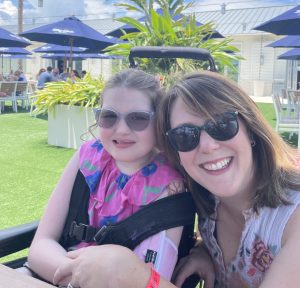 Understanding Caregiver Fatigue
Understanding Caregiver Fatigue
I sat with my therapist a few years ago and tried to put into words not how I was feeling, but rather the unsettling absence of emotion that had crept into my care-taking role. I explained that upon waking on Saturday mornings I experienced a reluctance to get out of bed that transcended my usual weekend exhaustion. The “I don’t want to,” echoing in my head felt unfamiliar. Out of conviction and principle I placed two feet on the floor and headed to the kitchen, where I prepared breakfast and my daughter’s morning medicine. At ten years of age, and a blessedly healthy sixty pounds of weight, my daughter, diagnosed with Rett Syndrome, requires full assistance with all activities of daily living.
After waking Luisa, I dutifully performed the changing and readying for the day, carefully choosing her outfit and then matching long socks to go under the tall leg braces I later slipped on and secured. Then, I transferred her to the wheelchair. I brushed her hair gently and chose a coordinating hair clip for the day. I explained to my therapist that what was missing in my morning care-taking routine was the “pause,” of laying beside my daughter in bed, whispering good morning, brushing her cheek with my lips, resting my nose in her neck and asking, “How was your night’s sleep?” while studying her face as the edge of her pink mouth turned upward, a half-smile before her eyes even opened.
Care-taking as of late, I explained to my therapist, had turned grey, missing the color and beauty of tiny moments.
It bothered me– the lack of delight, the routine, the obligation, rather than the contentment. I felt guilt that I was less than enthusiastic in my care-taking role, guilt that I could be doing more.
My therapist listened patiently, as they always do, and then spoke definitively into the room, “Sarah, I believe you have caregiver fatigue.” She went on to describe the signs of caregiver fatigue/burnout, which include emotional and physical exhaustion, withdrawal from friends and family, loss of interest in activities previously enjoyed, irritability, and frustration toward others. She went on to explain that my feelings of guilt were actually a symptom of burnout.
Taking Small Steps

My therapist recommended an increase in our family’s respite care hours. Respite care is a service provided to caretakers where a capable individual comes into the home to take care of a child or adult with a disability so that their care-takers can have a few hours of rest. (Respite care can also occur outside the home through ministries such as Aaron’s Staff Respite.) My therapist challenged me to use these respite hours on self-care, not ticking things off the to do list or running the other kiddos to and fro.
That’s easy to say, but difficult to do. So, I decided to start small. Some of the things I did included:
- Grabbing a Bendy’s ice cream sandwich to go and sit in my car to listen to a podcast or favorite band
- Taking a hike at Sicard Hollow with our dog
- Taking a restorative yoga class where it’s acceptable to spend most of the time in child’s pose
- Doing some reading outdoors in the sun
As I took these small moments, I noticed incremental returns to joy in my care-taking. Playfulness made its way back into the nightly routine. I lingered longer, taking time to sing and read, rather than the mechanical burnout of lift and move, brush and tidy.
Caregiver fatigue affects more than the special needs/disability world. It can impact new parents, those in the health professions, and those caring for the elderly.
My Advice
For me, learning to recognize the signs of burnout has led to intentional self-care. I have found the old adage to be true– we cannot pour from an empty cup.
As someone who still occasionally experiences care-taker fatigue, I advise the following:
- Fill your cup with those things that bring YOU life and joy, energy and rest.
- Recognize your own frailties and limitations.
- Seek help.
- Sit in silence and take some deep breaths.
- Eat the ice cream.
- Blast the rock ballads.
- Dance.











